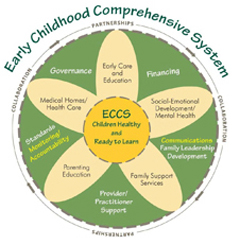Early Childhood Comprehensive Systems
Early Childhood Comprehensive Systems grants help states and communities to build and integrate early childhood service systems that better meet the needs of children and families.
Since 2003, 49 States, the District of Columbia, Guam, the Republic of Palau and the commonwealths of Puerto Rico and the Mariana Islands have participated in the program.
Five Key Components
Access to Health Care and Medical Homes
States are working to increase access to comprehensive health care by improving outreach across early childhood programs and integrating health promotion into all segments of the early childhood system. One of the key goals is to increase access to medical homes for all children. Medical homes provides medical care that is accessible, family centered, continuous, comprehensive, coordinated, compassionate, and delivered in a culturally competent environment.
Social-Emotional Development and Mental Health
Early childhood mental health refers to the social and emotional health factors that influence young children's development. Collaborative efforts are essential if parents and organizations that serve children and families are to develop environments that foster positive social-emotional development and that are well suited to identify social, emotional, and behavioral risks and intervene to prevent more serious mental health problems.
Early Care and Education
Early Childhood Comprehensive Systems promote the development of early care and education services for children from birth through five years of age that support children's early learning, health, and development of social competence. The program recognizes that many children receive these services through informal care arrangements and encourages initiatives that reach out to parents, informal caregivers, and family child care providers.
Parenting Education
Parenting education is intended to strengthen parents' and other caregivers' knowledge about how their actions affect child development and to foster the skills that enable them to ensure their child's healthy development and school readiness. Early Childhood Comprehensive Systems seeks to promote comprehensive parenting education programs that address the needs of all parents in communities and that are accessible and culturally appropriate. Parenting education that is parent-led and responsive to parent needs has the potential to promote parent leadership as well as improve parenting skills.
Family Support
The goal of family support initiatives is to help parents develop and use available resources that enable them to nurture and support the healthy development of their children. Family support services range from providing information about early learning, to helping families access benefits and connect with other families and community services.
The Maternal, Infant, and Early Childhood Home Visiting (MIECHV) program is one of several service strategies within a comprehensive, high-quality early childhood system. Both programs work to optimize health and development and rely on the best available research evidence to inform and guide practice.

Full-Size Flower Diagram (PDF - 81 KB)

